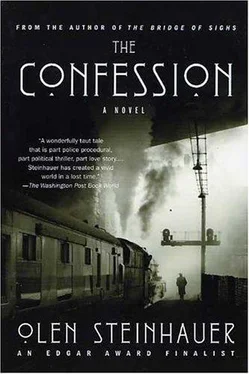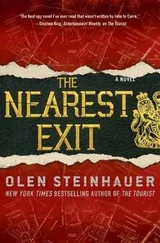Olen Steinhauer - The confession
Здесь есть возможность читать онлайн «Olen Steinhauer - The confession» весь текст электронной книги совершенно бесплатно (целиком полную версию без сокращений). В некоторых случаях можно слушать аудио, скачать через торрент в формате fb2 и присутствует краткое содержание. Жанр: Политический детектив, на английском языке. Описание произведения, (предисловие) а так же отзывы посетителей доступны на портале библиотеки ЛибКат.
- Название:The confession
- Автор:
- Жанр:
- Год:неизвестен
- ISBN:нет данных
- Рейтинг книги:5 / 5. Голосов: 1
-
Избранное:Добавить в избранное
- Отзывы:
-
Ваша оценка:
- 100
- 1
- 2
- 3
- 4
- 5
The confession: краткое содержание, описание и аннотация
Предлагаем к чтению аннотацию, описание, краткое содержание или предисловие (зависит от того, что написал сам автор книги «The confession»). Если вы не нашли необходимую информацию о книге — напишите в комментариях, мы постараемся отыскать её.
The confession — читать онлайн бесплатно полную книгу (весь текст) целиком
Ниже представлен текст книги, разбитый по страницам. Система сохранения места последней прочитанной страницы, позволяет с удобством читать онлайн бесплатно книгу «The confession», без необходимости каждый раз заново искать на чём Вы остановились. Поставьте закладку, и сможете в любой момент перейти на страницу, на которой закончили чтение.
Интервал:
Закладка:
“Did you have a good time?”
She grunted something incomprehensible.
“Well? What did you do?”
She pulled too hard on Pavel’s ear, and the dog made a squeaking noise in his sleep. “Picked apples, bought apples, talked apples.”
I laid a hand on her shoulder, then tugged her earlobe. “Miss me?”
She pulled her head away, but smiled. “Of course not.”
5
They had been working on the Ninth District for as long as I could remember. Whenever I left town for an extended period, I fantasized that when I crossed back over the muddy Tisa and drove north, the roads would be smooth, the piles of broken concrete gone. But now, as then, there were still three unfinished shells, and the road that wrapped around each unit of eight blocks had still not been paved. Long ago it had been plowed, some gravel thrown halfheartedly on it, but with each hard rain, the road slid into the ditches. Now that it was dry, the Skoda whined, climbing out of potholes, and crunched when it hit them. Pavel sprang up in the backseat, barking at a couple strays running past. Agnes was unconcerned, but I calculated damages in my head. The six-story blocks of Unit 15 to our left, set at an angle to the road, were lit yellow by the descending sun, and I wondered if she was up there, watching us navigate the holes and turn off the road into the well of shadow between the buildings, trying to get home. At least I hoped this with every muscle in my tight, sweating hands.
Children at the next corner climbed over a hill of concrete slabs, and just beyond them two slumped, babushkaed women fed chickens in the heat that in the provinces had been almost invigorating; here, it was only stifling. I parked by two other, older Skodas and a Russian make I didn’t know and grabbed our bags from the backseat. Agnes took Pavel. As we stepped over dry rivulets, one of the women with the chickens called to me: “Come arrest my brother, Comrade Inspector! I’ve been waiting a month!”
I measured out my syllables, as if for a child: “We’ve been through this, Claudia. I can’t arrest your brother for drinking in his own home. Anyway, homicide inspectors don’t take care of this. You have the number to call.”
“See what I told you?” she said to her friend, who hadn’t looked up from the chickens until now. “Just does his hours and goes home.”
The friend shook her head, muttering something I couldn’t hear. I started to tell Agnes to hurry up, but she was already ahead of me, looking down on Pavel, his leg raised, pissing absently on the corner of our block, Unit 15:6.
The mailbox was empty, which was a good sign. The stairs had been recently cleaned, though nothing could get rid of the smell of boiled cabbage, and on each landing someone had set out leafy green plants. On the top floor, there were none. Our door was locked. The apartment felt stuffy, unlived-in, and I began speculating wildly. We opened the windows, the fresh air bringing in voices and the hack of a car coughing to life.
“She’s not here,” said Agnes as she set Pavel on the rug. He did not run away, only peered around at the sofa and table and the wide German radio against the wall.
The bed didn’t look slept in. But Magda made it up every morning; it told me nothing. The icebox, though, had fresh milk. Agnes took out some water. She drank from the bottle and leaned against the counter, looking at me.
I hoped she wouldn’t repeat the obvious, because if she did I was afraid I might shout at her. She didn’t. She instead drank her water and left the kitchen, making tsk tsk sounds, calling for Pavel.
When she came across the note on the radio, I was still in the kitchen. The curtain was pulled, so it was very dark. Agnes, from the doorway, said, “Daddy?”
I didn’t answer right away, but noticed that she’d turned on the radio. Shostakovich murmured through the house. “What is it?”
“She left a note for you.”
Something seemed to crack inside me. She had a small sheet of paper in her hand. It was almost weightless, and when I brought it into the light of the living room it shook in my hand. I unfolded it by the window and got a clear view of the angular script. I read it twice to be sure. Then I almost laughed. It was a telephone message. Stefan, my old friend and Militia partner, had called. While I was on vacation-if that’s what it could be called-there’d been a case.
“Daddy?” said Agnes. She sounded afraid, so I smiled and turned up the Shostakovich.
“It’s nothing,” I said, my smile now authentic. “Someone’s been killed.”
6
I slept on the couch, because this was where I’d been sleeping for months. The mosquitoes woke me, but I survived by pulling the sheet over my head and sweating. I heard her come in, saw the dim light from the stairwell as she opened the door, then smelled the cigarettes on her clothes when she passed. Pavel whimpered in recognition. She didn’t look at me, and I didn’t say a thing.
A thump to the head woke me. Agnes’s stern face was in mine-she was dressed. “We’re going to be late,” she said.
“Have you walked your dog?”
Her expression relaxed.
“Well then,” I said.
I waited for the hot water to reach our floor, then shaved and gave myself a quick wash from the sink. I toweled off and went into the bedroom for clothes. Magda was still sleeping under a mess of sheets, her walnut hair curled against the pillow, and a bare, dirty foot stuck out below. I considered waking her, then realized she was probably already awake, playing dead until I left the apartment.
I drove Agnes to a cafe in the center before sending her off to school. I always did this on first days-the drive and the breakfast were to mark something important. There was the usual mess of blue work clothes and old, quiet men in berets who perked up at the sight of a young girl. We sat by the window. “Are you nervous?” She shrugged and pushed her glasses closer to her eyes. “First days are exciting.” But she didn’t answer; she was becoming quieter as she got older. She was becoming more like her mother.
Emil Brod and Brano Sev were the only ones in the office this early, and Brano, behind his files, turned his round face with its three moles and gave the usual, polite half nod. The last time I’d seen him, the state security inspector had a mouth full of metal braces, but now they were off, and his teeth, when he flashed a brief, self-conscious smile, were straight and true. It was a clever lie. We’d worked with him over a decade now, but like all the world’s secret policemen, his world was run by a dark logic none of us was privy to.
Emil’s blond hair was combed to a perfect part, like a schoolboy’s. “You’re back,” he said, smiling.
“I’m back.”
He sat on the corner of my desk. The smile wouldn’t leave him. “So?”
He was one of the few I’d told. I shook my head.
Emil was the youngest in Homicide, only thirty. We’d given him a hard time when he was first transferred here-there were misunderstandings on all sides-but after a while he became part of the wood-work. “No decisions, I guess?”
“We wait.”
“You know, Lena’s still willing to talk with her. It might help.”
I didn’t want his crazy wife talking to mine. “I still don’t think so.”
“You hear about Leon?”
“What?”
“His mother died.”
I looked up at him.
“Two weeks ago. We all went to the funeral, even the Comrade himself,” he said, tilting his head toward Brano’s desk. “Leon’s taking it badly.”
“I imagine.”
“He adored Seyrana. I liked her a lot too.”
“I never met her.”
He shrugged in a way that suggested these kinds of events were beyond us all, then got off my desk.
Читать дальшеИнтервал:
Закладка:
Похожие книги на «The confession»
Представляем Вашему вниманию похожие книги на «The confession» списком для выбора. Мы отобрали схожую по названию и смыслу литературу в надежде предоставить читателям больше вариантов отыскать новые, интересные, ещё непрочитанные произведения.
Обсуждение, отзывы о книге «The confession» и просто собственные мнения читателей. Оставьте ваши комментарии, напишите, что Вы думаете о произведении, его смысле или главных героях. Укажите что конкретно понравилось, а что нет, и почему Вы так считаете.












